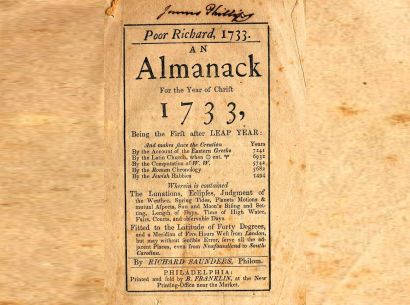This Week's Story
subscribe to podcast [click here] or play audio below
Success: Ben Franklin defeats business competition, builds his newspaper audience, and develops Poor Richard's Almanac for an international audience.

This Week’s Story relives American history and the Bible through brief inspiring stories presented on mp3 audio recordings and text for reading.
Yes! A possible solution! part four
Ben Franklin’s first love, before he began planning his marriage to Deborah, was his newspaper. It had a bumpy beginning in Philadelphia, Pennsylvania.
Philadelphia had The American Mercury newspaper. It put readers to sleep. As Ben prepared to start another newspaper, his plan was leaked to a competitor named Keimer, who rushed to start a second paper before Ben’s paper was published.
Ben Franklin decided, “I will put Keimer’s paper out of business.” He put anonymous articles into the American Mercury. The articles were interesting and often humorous. Franklin was considered one of the best writers in American in the 1730’s. Within six weeks it seemed every Philadelphian able to read was reading the American Mercury.
Keimer sold his paper to Ben and moved to the West Indies. Ben’s paper became one of the main papers in the Americas until long after Ben’s death.
Possibilities kept coming onto Ben’s radar. He added a book store to his print shop, a stationery store, practical products like medicinal ointment made by his mother-in-law, soap made by his brothers, and often coffee, tea, linseed oil, and chocolate. Later, he handled an abolition society. His first love remained his newspaper.
At age twenty-six Ben started publishing a yearly almanac. This occurred in the colonial days before the 13 Colonies fought the Revolutionary War. Nearly every home had a Bible and an almanac. Franklin’s almanac became widely used and popular. It was paper-bound and pocket-sized with information from many sources, and it was a profitable project!
Franklin called his almanac Poor Richard’s Almanack. It listed holidays, the tides and quarters of the moon, the dates of fairs and court sessions, and a huge variety of information catching readers’ yen for surprise.
Ben filled many spaces with wise sayings. He collected them from many languages and cultures. He made them pointed and easier to understand. Examples were, “Little strokes fell great oaks.” and “Fish and visitors stink in three days.”
The proverbs emphasized common sense, working hard , and saving money. The almanac was published by Franklin every year from 1732 through 1758. There were over 1,000 editions in English and 300 in other languages.
By 1748 Ben was forty-two years old and able to retire from his business ventures. Twenty years earlier he had begun his printing shop. He had helped several young men start businesses as printers and publishers. He received one-third of their profits. Now he had the leisure to read, study, and make scientific experiments. He became Franklin the scientist. He was fascinated with electrical experiments and bought much experimental equipment. Friends poured into his home to see his inventions.
He built the Franklin stove, bifocals, and an odometer, and a musical instrument called an armonica. He did not patent the inventions but showed them to people so they could develop them for their needs. He founded the country’s first scientific association.
Join Todd Warren, Carlos Gamez, and myself, Barbara Steiner, as we travel with Ben Franklin into science experiments, and the 13 Colonies’ struggles for freedom.
Explore thisweeksstory.com.
<< previous story] [next story >>
We invite your comments! [click here to comment]
This Week's Story is a non-profit supported by listeners. [click here to make a donation]
